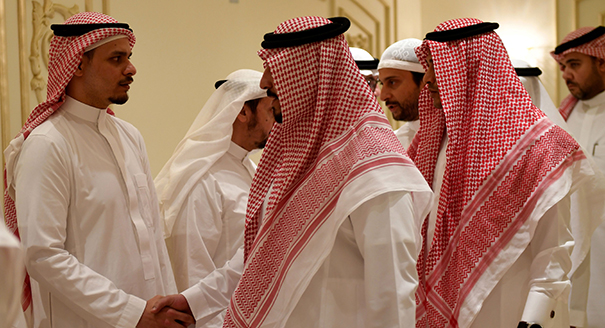In April, it will have been sixteen years since the United States invaded Iraq. The repercussions of the fall of Saddam Hussein’s regime generated many changes in the region. One of these was a new wave of Saudi nongovernmental activism that seized on the regional turmoil to break with radical Islamist and male-dominated activism.
Since that time, Islamist reformers, liberals, Shi‘a, and women have started offering an alternative to the regime’s and the radicals’ narratives on Saudi Arabia, as well as the kingdom’s relations with the United States. The crisis over the murder of journalist Jamal Khashoggi has put those unconventional Saudi voices under the spotlight of the U.S. Congress and media. However, the impact of this American spotlight has created challenges for these Saudi activists.
U.S. pressure has always mattered in Saudi Arabia. Congressional and media pressure today may be helping to prevent other crimes like the one that targeted Khashoggi. As of February 1, Saudi prosecutors dropped a demand for the death penalty against activist Isra‘ Al Ghomgham, the first female to potentially face capital punishment for political activism. Political prisoners are seeing implementation of their death verdicts postponed, even if very few of them are being released, or are seeing family members arrested with them released.
American pressure was, similarly, helpful during the early 2000s. Many of the current Saudi activists, whether inside the kingdom or in self-imposed exile, capitalized on American’s disruptive policies in the Middle East to engage in a new wave of Saudi activism. Their ability to pursue such efforts, which extended through the tumultuous years of the Arab uprisings after 2011, was not only due to a different approach from the Saudi leadership toward them, but also to American scrutiny following the September 11, 2001 attacks.
That being said, American public disapproval also makes Saudi activists vulnerable to domestic accusations of treason, conspiracy against their homeland, and Westernization. In the early 2000s, and probably until 2015, Saudi activism was mainly led from inside the kingdom. It did not matter that activists had no contact with the U.S. Embassy in Riyadh or that every petition to the monarchy began with a clear condemnation of the American intervention in Iraq and interference in Saudi domestic affairs. The official narrative inflamed nationalist sentiments against the activists, but so did American policies in Iraq, which fueled sectarianism that has ended up tainting Saudi Shi‘a activism until the present day.
The destruction of Iraq as well as the abuses at Abu Ghraib prison further exacerbated public hostility to any discussion of political reforms that resonated positively with the administration of then-president George W. Bush. Meanwhile, the United States, at the time still in shock over 9/11, persistently condemned Saudi society’s Islamist values and actors, without making a distinction between moderates and extremists.
Today, Congressional and media support for Saudi dissidents and activists still bears those scars, with which Saudi activists have to deal. A Saudi interviewed by the Washington Post after the Khashoggi murder said, “It shouldn’t have happened, but neither should Guantanamo Bay or Abu Ghraib.” Saudi activists have to face the challenge of rallying their fellow citizens who are living under increasing repression. They also have to deal with a Saudi public that wakes up daily to what some have dubbed “misguided, if not ill-intentioned” American criticism that shows the worst of their country, although many revolutionary reforms are taking place.
In the words of a Saudi woman also interviewed by the Washington Post, Saudis are legitimately asking, “Why is everyone attacking us?” Notwithstanding her caution in speaking to the newspaper where Khashoggi worked, such a view represents existing trends.
The Khashoggi killing shocked official Washington, which was forced to overcompensate for having endorsed Crown Prince Mohammed bin Salman as an enlightened reformer. The humanitarian consequences of the war in Yemen added to that, so that the kingdom in its entirety has become entangled in the current polarization of U.S. politics. This has further alienated Saudi public opinion.
The ongoing campaign of Saudi bashing, as in the aftermath of the 9/11 attacks, risks slipping into the condemnation of everything Saudi, forgetting that the kingdom, despite its name, is about more than the Al Saud. It leaves Saudis hostage to a narrative of nationalism built on foreign conspiracies. It also unintentionally unites Saudi patriotism with rallying around the crown prince.
Playing on those sentiments, a Saudi female writer in the daily Okaz observed, “We should never let our problems degrade the reputation of our society.” Such narratives directly target Saudi activists who are increasingly being forced into voluntary exile and resorting to social media to reach their compatriots.
The singling out of women and exiled dissidents in the campaign by foreign states against the Saudi government is also being used domestically to discredit Saudi activism. Such criticism of the kingdom is described as politically motivated, with the intention of bringing about the Westernization of Saudi society. This threatens rising support for the empowerment of women. It also risks marginalizing the hundreds of political prisoners in Saudi Arabia, especially reformist Islamists, whom Saudi female activists themselves are systematically defending.
There is no easy way out of such dilemmas, and it is up to Saudis to define the kind of backing that they want from the United States. Opening direct channels of public diplomacy with independent nongovernmental voices inside Saudi Arabia could be a good start. Congress and media outlets must be cautious not to lose Saudi public opinion, thereby reviving the post-9/11 anti-Americanism that provided a boost for extremist organizations. At the same time, it must not mean providing the Saudi state with unconditional support, as the Trump administration has done until now.






